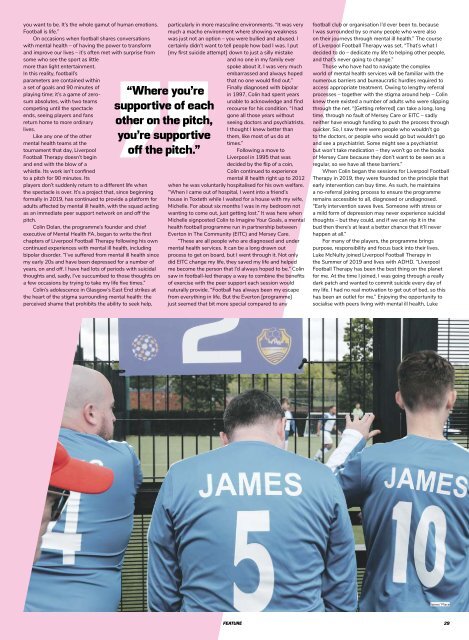Bido Lito! Magazine | Issue 114 | June 2021
Featuring: SPINN, IAMKYAMI, VASILY PETRENKO, LIVERPOOL FOOTBALL THERAPY, MONKS, SUPER COOL DRAWING MACHINE, CULTURAL SHIFT, JAMES CORBETT, STARKEY THE MESSENGER, THE LET GO, THE LOVELY EGGS, SHAME, WYLDEST, AND MORE.
Featuring: SPINN, IAMKYAMI, VASILY PETRENKO, LIVERPOOL FOOTBALL THERAPY, MONKS, SUPER COOL DRAWING MACHINE, CULTURAL SHIFT, JAMES CORBETT, STARKEY THE MESSENGER, THE LET GO, THE LOVELY EGGS, SHAME, WYLDEST, AND MORE.
Create successful ePaper yourself
Turn your PDF publications into a flip-book with our unique Google optimized e-Paper software.
you want to be. It’s the whole gamut of human emotions.<br />
Football is life.”<br />
On occasions when football shares conversations<br />
with mental health – of having the power to transform<br />
and improve our lives – it’s often met with surprise from<br />
some who see the sport as little<br />
more than light entertainment.<br />
In this reality, football’s<br />
parameters are contained within<br />
a set of goals and 90 minutes of<br />
playing time; it’s a game of zerosum<br />
absolutes, with two teams<br />
competing until the spectacle<br />
ends, seeing players and fans<br />
return home to more ordinary<br />
lives.<br />
Like any one of the other<br />
mental health teams at the<br />
tournament that day, Liverpool<br />
Football Therapy doesn’t begin<br />
and end with the blow of a<br />
whistle. Its work isn’t confined<br />
to a pitch for 90 minutes. Its<br />
players don’t suddenly return to a different life when<br />
the spectacle is over. It’s a project that, since beginning<br />
formally in 2019, has continued to provide a platform for<br />
adults affected by mental ill health, with the squad acting<br />
as an immediate peer support network on and off the<br />
pitch.<br />
Colin Dolan, the programme’s founder and chief<br />
executive of Mental Health FA, began to write the first<br />
chapters of Liverpool Football Therapy following his own<br />
continued experiences with mental ill health, including<br />
bipolar disorder. “I’ve suffered from mental ill health since<br />
my early 20s and have been depressed for a number of<br />
years, on and off. I have had lots of periods with suicidal<br />
thoughts and, sadly, I’ve succumbed to those thoughts on<br />
a few occasions by trying to take my life five times.”<br />
Colin’s adolescence in Glasgow’s East End strikes at<br />
the heart of the stigma surrounding mental health: the<br />
perceived shame that prohibits the ability to seek help,<br />
“Where you’re<br />
supportive of each<br />
other on the pitch,<br />
you’re supportive<br />
off the pitch.”<br />
particularly in more masculine environments. “It was very<br />
much a macho environment where showing weakness<br />
was just not an option – you were bullied and abused. I<br />
certainly didn’t want to tell people how bad I was. I put<br />
[my first suicide attempt] down to just a silly mistake<br />
and no one in my family ever<br />
spoke about it. I was very much<br />
embarrassed and always hoped<br />
that no one would find out.”<br />
Finally diagnosed with bipolar<br />
in 1997, Colin had spent years<br />
unable to acknowledge and find<br />
recourse for his condition. “I had<br />
gone all those years without<br />
seeing doctors and psychiatrists.<br />
I thought I knew better than<br />
them, like most of us do at<br />
times.”<br />
Following a move to<br />
Liverpool in 1995 that was<br />
decided by the flip of a coin,<br />
Colin continued to experience<br />
mental ill health right up to 2012<br />
when he was voluntarily hospitalised for his own welfare.<br />
“When I came out of hospital, I went into a friend’s<br />
house in Toxteth while I waited for a house with my wife,<br />
Michelle. For about six months I was in my bedroom not<br />
wanting to come out, just getting lost.” It was here when<br />
Michelle signposted Colin to Imagine Your Goals, a mental<br />
health football programme run in partnership between<br />
Everton in The Community (EITC) and Mersey Care.<br />
“These are all people who are diagnosed and under<br />
mental health services. It can be a long drawn out<br />
process to get on board, but I went through it. Not only<br />
did EITC change my life, they saved my life and helped<br />
me become the person that I’d always hoped to be.” Colin<br />
saw in football-led therapy a way to combine the benefits<br />
of exercise with the peer support each session would<br />
naturally provide. “Football has always been my escape<br />
from everything in life. But the Everton [programme]<br />
just seemed that bit more special compared to any<br />
football club or organisation I’d ever been to, because<br />
I was surrounded by so many people who were also<br />
on their journeys through mental ill health.” The course<br />
of Liverpool Football Therapy was set. “That’s what I<br />
decided to do – dedicate my life to helping other people,<br />
and that’s never going to change.”<br />
Those who have had to navigate the complex<br />
world of mental health services will be familiar with the<br />
numerous barriers and bureaucratic hurdles required to<br />
access appropriate treatment. Owing to lengthy referral<br />
processes – together with the stigma around help – Colin<br />
knew there existed a number of adults who were slipping<br />
through the net. “[Getting referred] can take a long, long<br />
time, through no fault of Mersey Care or EITC – sadly<br />
neither have enough funding to push the process through<br />
quicker. So, I saw there were people who wouldn’t go<br />
to the doctors, or people who would go but wouldn’t go<br />
and see a psychiatrist. Some might see a psychiatrist<br />
but won’t take medication – they won’t go on the books<br />
of Mersey Care because they don’t want to be seen as a<br />
regular, so we have all these barriers.”<br />
When Colin began the sessions for Liverpool Football<br />
Therapy in 2019, they were founded on the principle that<br />
early intervention can buy time. As such, he maintains<br />
a no-referral joining process to ensure the programme<br />
remains accessible to all, diagnosed or undiagnosed.<br />
“Early intervention saves lives. Someone with stress or<br />
a mild form of depression may never experience suicidal<br />
thoughts – but they could, and if we can nip it in the<br />
bud then there’s at least a better chance that it’ll never<br />
happen at all.”<br />
For many of the players, the programme brings<br />
purpose, responsibility and focus back into their lives.<br />
Luke McNulty joined Liverpool Football Therapy in<br />
the Summer of 2019 and lives with ADHD. “Liverpool<br />
Football Therapy has been the best thing on the planet<br />
for me. At the time I joined, I was going through a really<br />
dark patch and wanted to commit suicide every day of<br />
my life. I had no real motivation to get out of bed, so this<br />
has been an outlet for me.” Enjoying the opportunity to<br />
socialise with peers living with mental ill health, Luke<br />
James’ Place<br />
FEATURE<br />
29

















